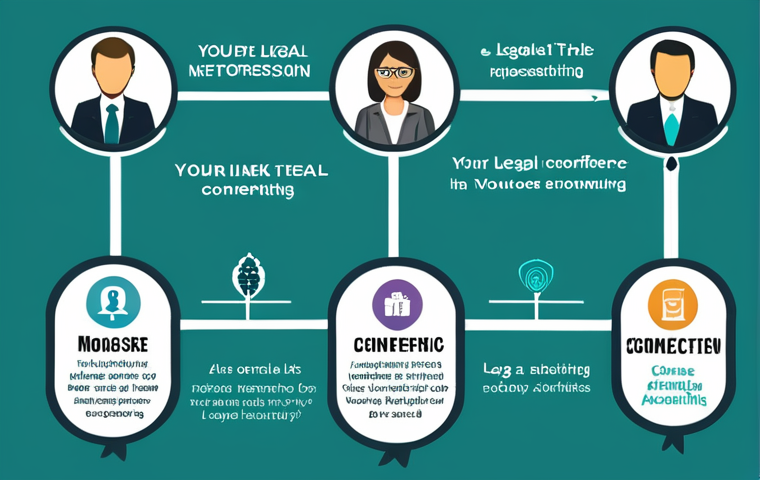The legal world, with its intricate laws and demanding clients, can sometimes feel like navigating a labyrinth. I’ve seen many brilliant legal minds, including myself at times, contemplate a change of scenery.
The allure of a new firm, a different practice area, or even a complete career shift is understandable, especially when the pressure cooker environment of legal practice starts to take its toll.
The current trends show that lawyers are increasingly prioritizing work-life balance and seeking opportunities that align with their personal values, a stark contrast to the traditional “grind it out” mentality.
Moreover, the rise of legal tech and AI is reshaping the legal landscape, prompting some to explore roles where they can leverage these advancements. But jumping ship without a solid plan is like sailing into uncharted waters without a compass.
It requires careful consideration of your skills, experience, and, most importantly, your goals. Having gone through this process myself, I know firsthand the questions that swirl in your mind: Where do I even start?
What are my options? How do I present myself in the best light? Let’s dive into the specifics and clarify how to best approach preparing for a career transition!
Okay, I understand. Here’s the blog post content:
Refine Your Resume: The Art of Legal Storytelling

Your resume isn’t just a list of past jobs; it’s a compelling narrative about your legal career. Think of it as your personal legal brief, presenting the most convincing arguments for why you’re the ideal candidate. I’ve seen countless resumes that simply list responsibilities, but the ones that truly stand out tell a story. They highlight accomplishments, quantify results, and demonstrate a clear progression of skills and experience. For instance, instead of saying “Managed a high volume of cases,” try “Successfully managed a caseload of 75+ active litigation files, resulting in a 90% favorable outcome rate for clients.” That level of detail and impact is what catches an employer’s eye. It’s about transforming mundane job descriptions into compelling evidence of your capabilities.
1. Quantify Your Achievements
Whenever possible, use numbers to showcase your impact. Did you increase case settlements by a certain percentage? Did you reduce legal costs for a client? These quantifiable achievements make your contributions tangible and demonstrate your value. I once helped a junior associate re-write their resume to include metrics like “Reduced client litigation costs by 15% through effective negotiation strategies,” and it significantly boosted their appeal to potential employers. These numbers provide concrete evidence of your abilities and instantly grab the attention of recruiters who are sifting through hundreds of applications. They also give the impression that you are detail-oriented and understand the importance of measuring your performance.
2. Tailor Your Resume to Each Application
A generic resume is a recipe for disaster. Take the time to customize your resume for each specific job you’re applying for. Carefully review the job description and identify the key skills and experience the employer is seeking. Then, tailor your resume to highlight those specific qualifications. This shows the employer that you’ve done your homework and that you’re genuinely interested in the position. For example, if a firm is looking for someone with experience in intellectual property law, make sure your resume emphasizes your experience in that area, even if it’s just a small portion of your overall legal background. It’s about highlighting the aspects of your experience that are most relevant to the employer’s needs. Think of it as tailoring a bespoke suit – it’s designed to fit perfectly and make the best impression.
Networking is Key: Building Your Legal Tribe
In the legal profession, it’s often said that it’s not just what you know, but who you know. Networking is an essential component of any successful career transition. Attend legal conferences, join professional organizations, and connect with attorneys in your desired field on LinkedIn. These connections can provide valuable insights, advice, and even job leads. I’ve personally landed several interviews through my network, and I’ve also helped countless colleagues find new opportunities by connecting them with the right people. Networking is about building relationships and fostering a sense of community within the legal profession. Don’t be afraid to reach out to people you admire or who are working in your dream role. Most people are happy to share their experiences and offer guidance. Remember, networking isn’t just about asking for favors; it’s about building mutually beneficial relationships.
1. Leverage LinkedIn for Professional Connections
LinkedIn is a powerful tool for networking and job searching. Optimize your profile with a professional headshot, a compelling summary of your skills and experience, and a detailed list of your accomplishments. Actively engage with other professionals in your field by liking, commenting on, and sharing their content. Join relevant groups and participate in discussions. Reach out to people you admire and ask for informational interviews. LinkedIn can be a goldmine of information and connections if you use it effectively. I’ve seen many attorneys land their dream jobs through LinkedIn networking. The key is to be proactive and persistent. Treat your LinkedIn profile as your online legal brand and cultivate it accordingly.
2. Attend Industry Events and Conferences
Legal conferences and industry events provide excellent opportunities to meet new people and learn about the latest trends in the legal field. Attend sessions that are relevant to your career goals and make an effort to connect with the speakers and other attendees. Bring plenty of business cards and be prepared to talk about your experience and interests. Follow up with the people you meet after the event to continue building those relationships. I always make it a point to attend the annual American Bar Association conference. It’s a great way to stay up-to-date on the latest developments in the legal profession and to connect with attorneys from all over the country. Remember, networking is a long-term investment in your career.
Mastering the Interview: Showcasing Your Legal Prowess
The interview is your chance to shine and demonstrate why you’re the best candidate for the job. Prepare thoroughly by researching the firm or organization, practicing your answers to common interview questions, and crafting insightful questions to ask the interviewer. Dress professionally and arrive on time. During the interview, be confident, articulate, and enthusiastic. Showcase your legal skills and experience with specific examples and anecdotes. And most importantly, be yourself. Let your personality and passion for the law shine through. I’ve seen many candidates with impressive resumes stumble during the interview because they weren’t prepared or they didn’t connect with the interviewer on a personal level. The interview is about more than just answering questions; it’s about building rapport and demonstrating your fit with the organization’s culture.
1. The STAR Method for Answering Questions
The STAR method is a powerful technique for answering behavioral interview questions. STAR stands for Situation, Task, Action, and Result. When answering a question, first describe the situation or context. Then, explain the task you were assigned. Next, detail the specific actions you took to address the task. Finally, highlight the results you achieved. This method helps you provide structured and compelling answers that showcase your skills and accomplishments. For example, if you’re asked about a time you faced a challenging legal issue, you could use the STAR method to describe the situation, explain the task of finding a solution, detail the actions you took to research and analyze the issue, and highlight the positive results you achieved for your client. The STAR method is a proven way to impress interviewers and demonstrate your problem-solving abilities.
2. Asking Insightful Questions
Asking thoughtful questions at the end of the interview shows that you’re engaged, curious, and genuinely interested in the opportunity. Prepare a list of questions in advance that demonstrate your knowledge of the firm or organization and your understanding of the role. Avoid asking questions that can be easily answered by reviewing the company’s website or the job description. Instead, focus on questions that delve deeper into the organization’s culture, values, and strategic goals. For example, you could ask about the firm’s approach to innovation, its commitment to diversity and inclusion, or its long-term vision for the future. Asking insightful questions not only demonstrates your interest but also gives you valuable information to help you decide if the job is the right fit for you. It’s a two-way street – the interview is an opportunity for you to assess the employer as well.
Negotiating Your Offer: Know Your Worth
Once you receive a job offer, don’t be afraid to negotiate your salary and benefits. Research the market rate for your skills and experience and be prepared to justify your request with concrete data. Consider factors such as your years of experience, your specialized knowledge, and the demand for your skills in the current market. Don’t be afraid to counteroffer if the initial offer doesn’t meet your expectations. However, be respectful and professional throughout the negotiation process. Remember, the goal is to reach a mutually beneficial agreement that reflects your value and satisfies your financial needs. I’ve seen many attorneys leave money on the table because they were afraid to negotiate. Don’t make that mistake. Know your worth and be confident in your ability to advocate for yourself. Negotiation is a skill that every lawyer should master, and it’s essential for securing the compensation and benefits you deserve.
1. Researching Salary Benchmarks
Before you begin negotiating your salary, it’s essential to research salary benchmarks for similar positions in your geographic area. Websites like Salary.com, Glassdoor, and Payscale can provide valuable insights into average salaries for attorneys with your skills and experience. You can also consult with legal recruiters and career advisors to get a sense of the market rate. Keep in mind that salary benchmarks are just a starting point. Your actual salary will depend on factors such as your specific qualifications, the size and reputation of the firm, and the overall economic climate. However, having a solid understanding of salary benchmarks will give you a strong foundation for your negotiation. It’s about arming yourself with information so you can make informed decisions and advocate for your worth.
2. Considering Benefits and Perks
Salary is not the only factor to consider when evaluating a job offer. Benefits and perks can add significant value to your overall compensation package. Be sure to carefully review the employer’s health insurance plan, retirement plan, paid time off policy, and other benefits. Consider whether the employer offers perks such as student loan repayment assistance, professional development opportunities, or flexible work arrangements. These benefits can make a big difference in your quality of life and your overall job satisfaction. Don’t be afraid to negotiate for additional benefits if the initial offer doesn’t meet your needs. For example, you could ask for additional vacation time, a signing bonus, or reimbursement for continuing legal education expenses. It’s about looking at the total package and ensuring that it meets your financial and personal goals.
Embrace Continuous Learning: Staying Ahead of the Curve
The legal profession is constantly evolving, so it’s essential to embrace continuous learning throughout your career. Stay up-to-date on the latest legal developments, attend continuing legal education (CLE) courses, and seek out opportunities to expand your knowledge and skills. Consider pursuing certifications or specializations in your area of expertise. By staying ahead of the curve, you’ll make yourself more marketable and increase your chances of landing your dream job. I’ve seen many attorneys who have become stagnant in their careers because they stopped learning and growing. Don’t let that happen to you. Invest in your professional development and make continuous learning a priority. It’s about staying relevant and competitive in a dynamic and ever-changing legal landscape.
1. Continuing Legal Education (CLE)
Continuing Legal Education (CLE) is a mandatory requirement for attorneys in most jurisdictions. However, CLE is not just about meeting your ethical obligations. It’s also a valuable opportunity to expand your knowledge and skills, learn about the latest legal developments, and network with other professionals in your field. Choose CLE courses that are relevant to your career goals and that will help you develop new skills. For example, if you’re interested in intellectual property law, you could take CLE courses on patent law, trademark law, or copyright law. CLE is an investment in your future and a way to demonstrate your commitment to professional excellence. I always make it a point to attend CLE courses on topics that are outside of my immediate area of expertise. It helps me broaden my horizons and gain a better understanding of the legal landscape as a whole.
2. Certifications and Specializations
Earning certifications or specializations in your area of expertise can enhance your credibility and make you more marketable to potential employers. There are numerous certifications available for attorneys in various fields, such as bankruptcy law, estate planning, and criminal law. Research the certifications that are most relevant to your career goals and pursue them diligently. Earning a certification demonstrates your commitment to excellence and your expertise in a particular area of law. It can also open doors to new opportunities and increase your earning potential. I know several attorneys who have significantly boosted their careers by earning certifications in specialized areas of law. It’s about differentiating yourself from the competition and demonstrating your commitment to professional development.
Crafting a Compelling Cover Letter: Making a Strong First Impression
A well-crafted cover letter is your opportunity to make a strong first impression and showcase your personality, writing skills, and enthusiasm for the role. Tailor your cover letter to each specific job application, highlighting your relevant skills and experience and explaining why you’re the best candidate for the position. Address the cover letter to a specific person whenever possible and proofread it carefully for errors. Avoid simply regurgitating your resume. Instead, use the cover letter to tell a compelling story about your career journey and your passion for the law. I’ve seen many talented attorneys lose out on job opportunities because they submitted generic or poorly written cover letters. Don’t make that mistake. Invest the time and effort to craft a compelling cover letter that will grab the reader’s attention and make them want to learn more about you.
1. Highlighting Relevant Skills and Experience
When crafting your cover letter, focus on highlighting the skills and experience that are most relevant to the specific job you’re applying for. Carefully review the job description and identify the key qualifications the employer is seeking. Then, tailor your cover letter to emphasize your relevant skills and experience, providing specific examples of how you’ve used those skills to achieve positive results. Use action verbs and quantifiable achievements to demonstrate your impact. Avoid vague or generic statements. Instead, focus on providing concrete evidence of your abilities. For example, instead of saying “I have strong research skills,” try “I conducted extensive legal research on complex environmental issues, which resulted in a successful outcome for my client.” It’s about demonstrating your value and showing the employer how you can contribute to their organization.
2. Showcasing Your Personality and Enthusiasm
Your cover letter is also an opportunity to showcase your personality and enthusiasm for the role. Let your passion for the law shine through and demonstrate your genuine interest in the organization and its mission. Use a conversational tone and avoid being overly formal or stiff. Let your unique personality shine through and show the employer that you’re not just a skilled attorney but also a personable and engaging individual. However, be careful to maintain a professional tone and avoid being too informal or casual. The key is to strike a balance between professionalism and personality. I always encourage my clients to inject a bit of their personality into their cover letters. It helps them stand out from the crowd and make a memorable impression on the reader. Remember, employers are looking for more than just technical skills. They’re also looking for people who are a good fit for their organization’s culture and who will be enthusiastic and engaged members of the team.
Understanding the Current Legal Job Market: Trends and Opportunities
Staying informed about the current legal job market is crucial for a successful career transition. Research the latest trends, identify emerging opportunities, and understand the skills that are in high demand. Consider attending webinars, reading industry publications, and consulting with legal recruiters to stay up-to-date on the latest developments. The legal job market is constantly evolving, and what was in demand yesterday may not be in demand today. By staying informed, you can position yourself for success and increase your chances of landing your dream job. I’ve seen many attorneys who have struggled to find new opportunities because they were out of touch with the current job market. Don’t let that happen to you. Make staying informed a priority and adapt your skills and strategies accordingly.
1. Emerging Practice Areas
Certain practice areas are experiencing significant growth and demand in the current legal job market. These emerging practice areas include data privacy and cybersecurity, renewable energy law, and cannabis law. If you’re looking to make a career transition, consider exploring these emerging practice areas. They offer exciting opportunities for attorneys with the right skills and experience. I’ve seen many attorneys successfully transition into these emerging practice areas by taking CLE courses, earning certifications, and networking with professionals in those fields. It’s about identifying where the market is going and positioning yourself to take advantage of those opportunities. Emerging practice areas often offer higher salaries and greater opportunities for advancement.
2. The Rise of Legal Tech
Legal technology (legal tech) is rapidly transforming the legal profession. Attorneys who are proficient in legal tech tools and technologies are in high demand. Consider taking courses or workshops to develop your legal tech skills. Learn about artificial intelligence (AI), blockchain, and other emerging technologies that are impacting the legal profession. By embracing legal tech, you can enhance your efficiency, improve your client service, and increase your marketability. I’ve seen many attorneys who have successfully transitioned into legal tech roles by developing their technical skills and demonstrating their understanding of the intersection between law and technology. Legal tech is not just a trend; it’s the future of the legal profession.
Table: Key Steps for a Successful Legal Career Transition
| Step | Description | Action Items |
|---|---|---|
| 1. Self-Assessment | Identify your skills, interests, and values. | Reflect on your past experiences, take skills assessments, and define your career goals. |
| 2. Resume and Cover Letter Refinement | Craft compelling documents that showcase your strengths. | Quantify achievements, tailor to each application, and highlight relevant skills. |
| 3. Networking | Build connections and leverage professional relationships. | Attend events, use LinkedIn, and reach out to contacts. |
| 4. Interview Preparation | Practice your answers and research the employer. | Use the STAR method, prepare insightful questions, and dress professionally. |
| 5. Negotiation | Know your worth and negotiate salary and benefits. | Research benchmarks, consider the total package, and be confident in your value. |
| 6. Continuous Learning | Stay up-to-date on the latest legal developments. | Attend CLE courses, earn certifications, and embrace legal tech. |
In Conclusion
Navigating a legal career transition can feel like navigating a complex legal case itself. However, with careful planning, strategic networking, and a commitment to continuous learning, you can successfully transition into your dream role. Remember to showcase your unique strengths, tailor your approach to each opportunity, and never underestimate the power of building relationships. Your legal career is a marathon, not a sprint, so embrace the journey and celebrate your successes along the way.
Useful Information
1. Networking Events: Check out local bar associations and legal organizations for networking events in your area. They often host mixers, workshops, and conferences where you can connect with other legal professionals.
2. Online Job Boards: Explore popular job boards like Indeed, LinkedIn, and Lawjobs.com for legal job openings. Set up job alerts to receive notifications when new positions that match your criteria are posted.
3. Salary Negotiation Resources: Consult resources like the Robert Half Salary Guide and the National Association for Law Placement (NALP) Salary Survey for information on average salaries for legal positions in your region.
4. Resume Writing Services: Consider using a professional resume writing service specializing in legal resumes. They can help you craft a compelling resume that highlights your skills and experience in a way that resonates with employers.
5. Mentorship Programs: Look for mentorship programs offered by bar associations or law schools. Mentors can provide valuable guidance and support during your career transition.
Key Takeaways
A successful legal career transition requires a proactive approach that encompasses self-assessment, resume refinement, strategic networking, thorough interview preparation, and confident negotiation. Embrace continuous learning and stay informed about the evolving legal job market to position yourself for success. By following these steps, you can increase your chances of landing your dream legal job and achieving your career goals.
Frequently Asked Questions (FAQ) 📖
Q: I’m feeling burnt out and considering leaving my firm, but I’m worried about taking a pay cut or ending up in a worse situation. How can I realistically assess my options and avoid making a rash decision?
A: That’s a valid concern! Burnout is rampant in this profession. Before you do anything drastic, take a hard look at your finances.
Can you afford a potential salary decrease, even temporarily? Research average salaries for the roles you’re considering, factoring in your experience.
Networking is crucial here. Talk to people who’ve made similar transitions. See if you can find a mentor who’s been there, done that.
I remember feeling paralyzed by fear when I considered leaving my old firm. Talking to a former colleague who’d successfully transitioned to a non-profit role gave me the confidence to explore my options.
Don’t be afraid to ask tough questions, like how they handled the transition and what they wish they’d known beforehand. Also, consider a trial run if possible.
Can you volunteer or take on a project in your target field to see if it’s truly a good fit? I shadowed a friend who worked as in-house counsel for a week, and it confirmed that it was a direction I wanted to pursue.
Q: I’ve been practicing law for 10 years, and I’m worried my skills are too specialized. How can I make my skillset attractive to employers in different industries or roles?
A: You’d be surprised at how transferable your legal skills are! Think about the core competencies you’ve developed: critical thinking, problem-solving, negotiation, communication, and research.
These are highly valued in many fields. The key is to frame your experience in a way that resonates with your target audience. Don’t just list your responsibilities; highlight the results you achieved.
For example, instead of saying “Drafted contracts,” say “Drafted and negotiated complex contracts, resulting in a 15% reduction in legal disputes.” Tailor your resume and cover letter to each specific role, emphasizing the skills and experiences that are most relevant.
I remember struggling with this myself. I had spent years specializing in M&A, but I wanted to move into legal tech. I took an online course in data analytics and highlighted my experience with due diligence and risk assessment in my resume, framing it as experience with large data sets.
Show, don’t just tell. Quantify your accomplishments whenever possible. Networking again plays a critical role.
Attend industry events and connect with people in your target field to learn more about their needs and how your skills can meet them.
Q: The legal job market is getting increasingly competitive, especially with the rise of
A: I. How can I stand out from other candidates and demonstrate my value? A3: You’re right, the legal landscape is rapidly evolving.
To stand out, you need to showcase your unique value proposition. That includes demonstrating your adaptability, embracing technology, and highlighting your soft skills.
Take the time to familiarize yourself with the latest legal tech tools and AI platforms. Consider taking courses or attending workshops to enhance your skills.
But don’t underestimate the importance of human skills, like empathy, emotional intelligence, and leadership. These are qualities that AI can’t replicate.
I’ve seen lawyers excel by focusing on building strong client relationships and becoming trusted advisors. When interviewing, don’t be afraid to share examples of how you’ve gone above and beyond for clients or colleagues.
Showcase your ability to think creatively, solve complex problems, and adapt to changing circumstances. Also, consider building your personal brand online.
Create a professional website or blog and share your insights on relevant topics. Contribute to industry publications or speak at conferences. The more visible you are, the more likely you are to attract the attention of potential employers.
I started a blog about legal technology trends and it’s led to multiple job opportunities and consulting gigs.
📚 References
Wikipedia Encyclopedia
구글 검색 결과
구글 검색 결과
구글 검색 결과
구글 검색 결과
구글 검색 결과






